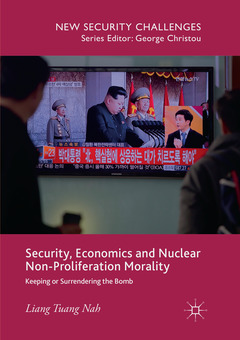Description
Security, Economics and Nuclear Non-Proliferation Morality, Softcover reprint of the original 1st ed. 2018
Keeping or Surrendering the Bomb
New Security Challenges Series
Author: Nah Liang Tuang
Language: English
Subject for Security, Economics and Nuclear Non-Proliferation Morality:
Publication date: 05-2018
Support: Print on demand
Approximative price 116.04 €
In Print (Delivery period: 15 days).
Add to cartPublication date: 09-2017
Support: Print on demand
Description
/li>Contents
/li>Biography
/li>Comment
/li>
This book seeks to elucidate the decisions of states that have chosen to acquire nuclear arms or inherited nuclear arsenals, and have either disarmed or elected to retain their warheads. It examines nuclear arms policy via an interconnected framework involving the eclectic use of national security based realism, economic interdependence liberalism, and nuclear weapons norms or morality based constructivism. Through the various chapters examining the nuclear munitions decisions of South Africa, Ukraine and North Korea, a case is built that a state?s leadership decides whether to keep or give up ?the Bomb? based on interlinked security, economic and norms governed motivations. Thereafter, frameworks evaluating the likelihood of nuclear proliferation and accessing the feasibility of disarmament are then applied to North Korea and used to examine recent Iranian nuclear negotiability. This book is an invaluable resource for international relations and security studies scholars, WMD analysts and post graduate or undergraduate candidates focusing on nuclear arms politics related courses
Chapter One: Introduction.- Chapter Two: Theories, Conceptual Model, Initial Case Analysis and Excluded Considerations.- Chapter Three: South Africa as a Classic Nuclear Armament and Disarmament Exemplar.- Chapter Four: Fiercely Negotiated Ukrainian Nuclear Disarmament.- Chapter Five: Contentious North Korean Disarmament Prospects.- Chapter Six: Policy Relevant Tripartite Theory Nuclear Policy Models and their Application to North Korea.- Chapter Seven – Conclusion: Can the Tri-Theoretic Models explain the Iranian Case?.
Liang Tuang Nah is a Research Fellow with the military studies programme of the Institute of Defence and Strategic Studies S. Rajaratnam School of International Studies, Nanyang Technological University, Singapore. He is also an international relations and security studies instructor to officers of the Singapore Armed Forces.




